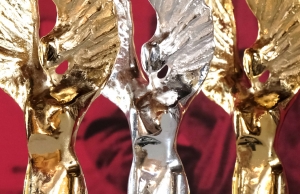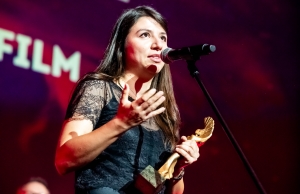The Polish School of Boozing – A Meeting with Robert Więckiewicz and Łukasz Kośmicki

He played Jerzy Pilch’s alter ego, father Tadeusz in Clergy, Janusz Kondratiuk, or Lech Wałęsa. Thanks to all the mentioned roles and many others, the ubiquitous Robert Więckiewicz has secured himself a unique position in Polish cinema, in recent years. He has become the inimitable face of a kind-hearted Pole – one with their own peccadilloes, with a penchant for vodka, but with a golden heart. The character of Alfred, director of the Palace of Culture and Science in Warsaw, portrayed in Ukryta gra / The Coldest Game by Łukasz Kośmicki, may seem to be yet another similar role in his portfolio. However, working on the film set brought about a lot of challenges, as it turned out at the meeting with the actor following the pre-release screening of the film. Are you keen on knowing what they were? If so, keep on reading.
Łukasz Maciejewski started the meeting with a number of warm-up questions about the very first memories our guests had about the Palace of Culture and Science in Warsaw, which is the central spot in the film. The film director said that he felt really thrilled when visiting Warsaw in his childhood years with his father, who went there to receive his professorship. That memory of the powerful first impression has stayed with him ever since. Young Robert Więckiewicz first saw the gift from the Stalin’s Soviet Union to the people of Poland in TV and was reluctant to believe it really existed, until he travelled to the capital city of Warsaw to “get some fresh air.” He remembers that the building was standing all alone in there, as Marriot Hotel and other skyscrapers would be erected much later.
Łukasz Kośmicki, who makes his full-length début with The Coldest Game, is a man of many talents and well-read, a true Renaissance man, according to Robert Więckiewicz himself. He used to work as a cinematographer for Krzysztof Krauze, Filip Bajon, or Łukasz Zadrzyński, produced commercials all over the world, and was actively involved in working with Wojtek Smarzowski, for example on the script for Dom zły / The Dark House. In each of the incarnations, his contribution to the projects he was involved in brought him awards. The director, usually showing quite modest demeanour, and the actor, both of them friends in real life, laughed that Łukasz Kośmicki would quite soon compete for an award in the “best supporting female character.”
Robert Więckiewicz and the people selecting promising scripts considered it to be so authentic that it simply had to be a reconstruction of a historic event. The film is a story about previously unknown facts about the Cuban Missile Crisis discussed behind-the-scenes of a chess game between the USSR and the USA. The director and screenwriter in one person claims that he acted quite cynically, when building the plot in the film. The phantom of a nuclear war was a topic both frightening and appealing, the main role was designed for an American actor in his sixties – as such actors usually accept international casting offers, when their glory days in Hollywood are long gone, and last but not least, the very Palace of Culture and Science with its strong local connotations to make sure that nobody from other countries would buy the project.
Robert Więckiewicz was simply enchanted with the script and the role written precisely for him. The actor likes ambiguous characters, and Alfred is exactly like that. On one hand, Alfred is a powerful party activist, a beneficiary of the system, a little rough around the edges and fun-loving, but deep inside he is a dissident tormented by inner turmoil, who has truly positive feelings for people coming from America. The opportunity to confront his professional skills with Aleksei Serebryakov and Lotte Verbeek, both of them award-winning actors from the USA, brought surprising results for Robert Więckiewicz. The Pole is capable of playing a drunkard all too well. He can be so convincing that the cream of international cinema was afraid to share the stage with him. A number of American focus groups, who watched the film before its scheduled première in the USA, were just as excited with him.
Both the director and the actor were very casual in giving details about various complications one encounters when working on a high-budget film with international cast. One of the greatest crisis came with what would later be referred to as “the Bill switch.” At first, the main role was tailored for William Hurt, a guru among actors and a winner of Oscar for Kiss of the Spider Woman. Unfortunately, he had had an accident before arriving on set, and since one of his shooting days was already paid for, filmmakers were in need for a quick replacement. Bill Pullman came to the rescue, who called from California willing to give up on his time off between shooting for the TV series The Sinner and help with pushing the Polish film forward.
Bill Pullman came with his own vision of the role and expected the film director to make some concessions regarding his suggestions. It led to a number of small-time arguments on the set. As for Robert Więckiewicz, he found it hard to adapt to a new partner in the film, but he commented on it in a democratic and humorous way: I had no reason to yell at Bill on any specific occasion. Bill Pullman simply fell in love with Poland, spent a lot of time walking through the streets of Warsaw, and had a taste of beef tripe. One thing he was not prepared for was the weather, though. Coming on set in his light leather jacket and a scarf to shoot the film at the temperature of minus twenty degrees Celsius turned out to be a real survival for him. Both the director and the actor have good memories of their work on set, despite minor tensions and stresses keeping up with deadlines.
To sum up this very straightforward and humorous meeting, when asked right at the end of it about the most demanding role in his career, Robert Więckiewicz replied in is well-known bawdy manner: It was having to say “I do” to my wife.
Dawid Smyk
Also in this section
- Idea
- Sections
- Awards
- Volunteers
- Archive

